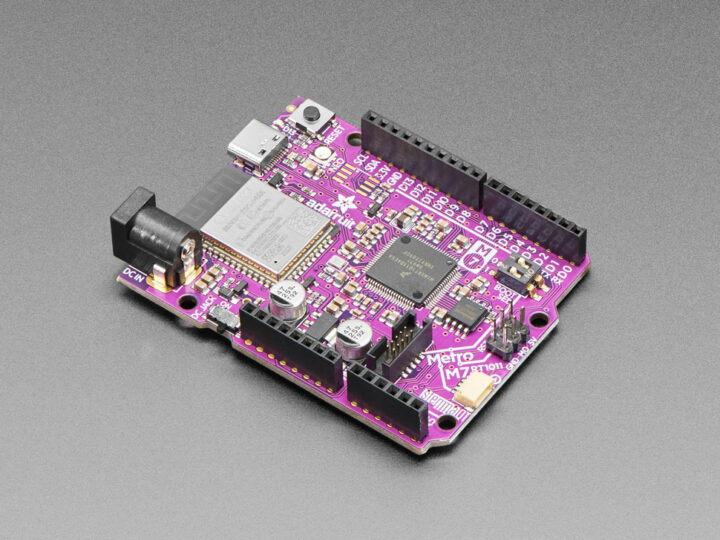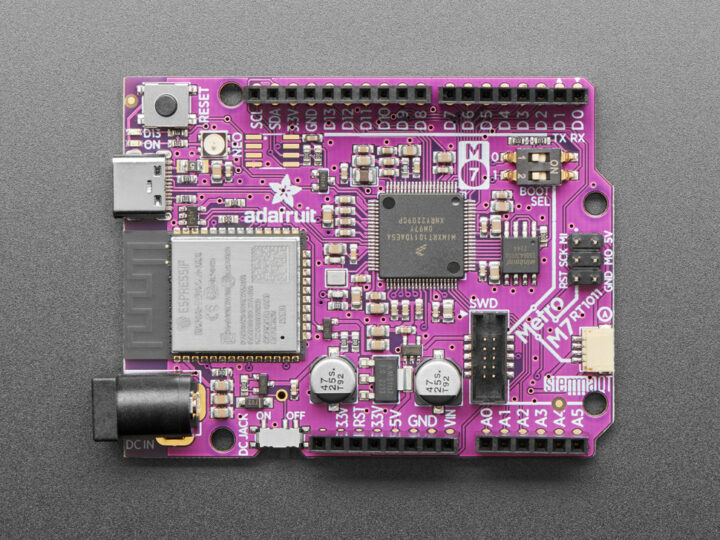Adafruit Metro M7 is a development board based on a 500 MHz NXP i.MX RT1011 Arm Cortex-M7 crossover MCU that follows Arduino UNO form factor and integrates the ESP32-based “AirLift” WiFi module for wireless connectivity.
The board also comes with 4MB QSPI storage, a few LEDs and buttons, a Qwiic connector for additional expansion beyond Arduino Shields, and an SWD connector for debugging. The board takes 6V to 12V DC input via a power barrel jack, but can also be powered through its USB Type-C port.
Adafruit Metro M7 specifications:
- SoC – NXP iMX RT1011 crossover microcontroller with an Arm Cortex-M7 clocked at 500 MHz and 128KB SRAM/TCM
- Storage – 4MB of QSPI XIP Flash
- Wireless – AirLift WiFi co-processor with TLS/SSL support (better known as ESP32-WROOM-32)
- USB – 1x USB Type-C port for power and programming
- Expansion
- Arduino UNO headers for Arduino shields compatibility
- STEMMA QT connector for I2C devices
- Debugging – SWD connector for advanced debugging access.
- Misc – On/Off switch, Reset button, Boot-mode DIP switch, Power and user LEDs, NeoPixel RGB LED
- Power Supply – 6-12V DC barrel jack or USB Type-C port
- Dimensions – 72 x 53.2 x 14.8mm (Arduino UNO form factor)
- Weight – 22.5 grams
Adafruit provides a UF2 bootload for the Metro M7 board in order to facilitate the installation of the CircuitPython firmware. The board should probably be the fastest non-Linux-capable Arduino UNO-compatible board on the market.
The Metro M7 board is sold for $29.99 on the Adafruit store. It is out of stock at the time of writing, but you can always leave your email on Adafruit website to be notified when the board is back in stock.
Via Heise and thanks to Heiko for the tip.

Jean-Luc started CNX Software in 2010 as a part-time endeavor, before quitting his job as a software engineering manager, and starting to write daily news, and reviews full time later in 2011.
Support CNX Software! Donate via cryptocurrencies, become a Patron on Patreon, or purchase goods on Amazon or Aliexpress







Adafruit building on the backs of other projects that did all the hard work again.
Can you elaborate on this comment or maybe point to where I should look for news about this? I am really curious before I make an order. Thank you.
Take a look at the Teensy 4.0 and 4.1 boards by Paul Stoffregen’s company PJRC
He’s created more featurefull boards and added Arduino IDE support for them for many years. He’s contributed code to the IDE as well. He’s a great example of how to work with an ecosystem to benefit everyone.
That’s what open source is, and exactly how it’s supposed to work.
Filing off the serial numbers and pretending it’s your work isn’t how Open Source is supposed to work.
That’s exactly what open source is and how it’s supposed to work David..
The Arduino shields can carry +5V signals, but many new cards only use 3V. Without safety circuits, the wrong plug-in card can destroy this product.
The new CPU may run at 500MHz, but the Arduino shield connector can’t handle that speed.
All up, the Arduino connectors are convenient- BUT they also limit more powerful products. Adafruit would be better served by introducing a new standard (3.3V, or even 2.4V) with differential pairs capable of higher data speeds.
I’m pretty sure PJRC’s Teensy boards are not open source software. They use a proprietary bootloader which they vehemently protect…. LINK (https://forum.pjrc.com/threads/41751-Is-the-Teensy-boot-loader-source-available). That makes a majority of all their open source library contributions, marketing and support for their Teensy boards ONLY. That being said, Teensy is a great board, with largely open sourced hardware from the makers. But Adafruit’s Metro seems to be a completely different software target, as it only supports CircuitPython as compared to Teensy’s Arduino.
I think you’re confusing open source software and open source hardware.